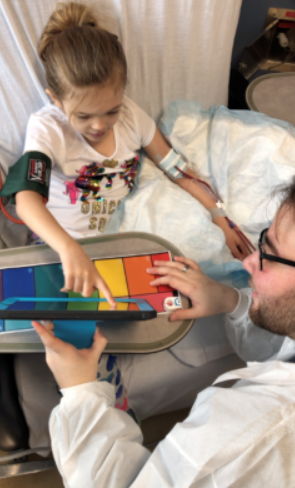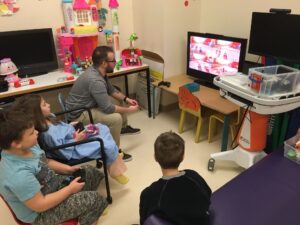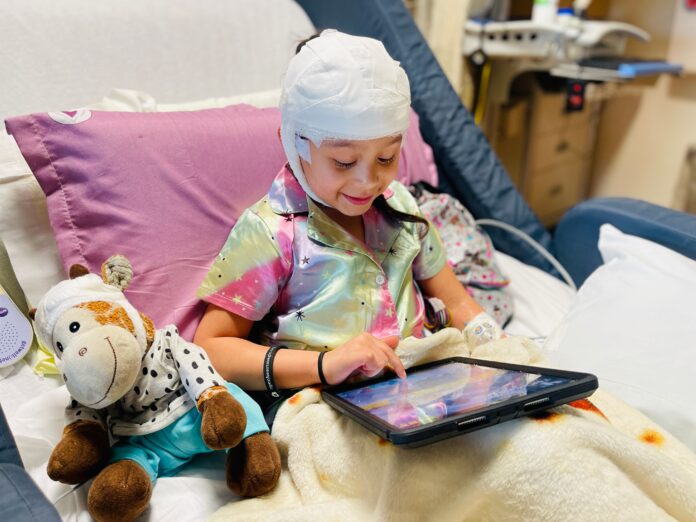Connor Rivera’s remarkable journey began in 2018 when he crossed paths with J. J. Bouchard, C. S. Mott Children’s Hospital’s Manager of Therapeutic Gaming and Patient Technology. At the time Rivera was working at the Apple Store in Briarwood Mall and was introduced to J.J.’s program at the hospital and some of the barriers with their current iPads.

In an interesting twist of events, Rivera ended up volunteering at video game parties for the children at Mott.
Rivera fondly reminisces, “After going to three of them I [asked J.J.] ‘When are you hiring because I want to do this forever?’”
And that was the turning point. Thanks to a donation from Child’s Play Charity to hire Patient Technology Specialists at Mott, Rivera was able to leave his job of repairing phones behind and embarked on a completely unfamiliar path.
Today, as Mott’s child and family life patient technology project manager, Rivera radiates enthusiasm when describing the Therapeutic Gaming and Patient Technology Program.
“We use technology every day with kids,” Rivera said. “We use video games, V/R, A/R, tablets, we teach some basic robotics and Steam coding.” The program aims to ease the hospital experience for young patients, offering them a chance to normalize their environment and momentarily escape their circumstances.

“offering game play gives that kid the power of choice which is so hard in a hospital environment,” Rivera said.
By giving kids the power to choose, they are afforded a sense of control that is often lacking in a hospital setting. They are constantly subjected to procedures and treatments without much say. So, this becomes an empowering experience for them
The barriers
When the COVID-19 pandemic struck and everything shifted to virtual platforms, it became apparent that expanded gaming options were desperately needed. Many kids lacked devices, and even those who had them often encountered issues due to compatibility problems with the hospital’s internet security.
Moreover, with only two patient technology specialists available, bringing the gaming carts — loaded with a wide range of systems like Xboxes, Nintendo Switches, and PlayStations — to someone’s room became a bottleneck in the therapeutic gaming process
This bottleneck added another barrier to the department’s ability to use video games therapeutically.
Bridging the gap
To address these challenges, Rivera reached out to Child’s Play Charity, an existing funding partner, who generously donated $240,000 to launch the iPad program at C.S. Mott Children’s Hospital.
Seeing the project through its entire life cycle, from planning to implementation, required years of Rivera’s unwavering dedication. Numerous departments had to approve every step, resulting in a maze of red tape. Strict controls were put in place, covering everything from device security to sanitation and everything in between.
The apps themselves underwent approval by child life specialists, who assessed them from a child development perspective to ensure appropriateness for young patients.
To prevent excessive screen time, charging cables are kept outside the patient rooms. Once a device’s battery dies, it is taken to the nurse’s station for recharging and returned to the child the following day.
The gaming experience can even be tailored to the child’s abilities. For instance, if a child struggles with holding or maneuvering the game controls, adaptive equipment can be provided.
“We’ve even partnered with our rehab engineering team to get hospital-approved mounts to hold the device (for those who can’t hold it themselves),” Rivera said.
Through this program, nurses can swiftly and easily provide an iPad to young patients, eliminating the need to wait for the gaming cart or a volunteer. Additionally, this reinforces the vital element of human connection in a more relaxed, non-medical interaction
Learn more on how to support, volunteer or get involved.


